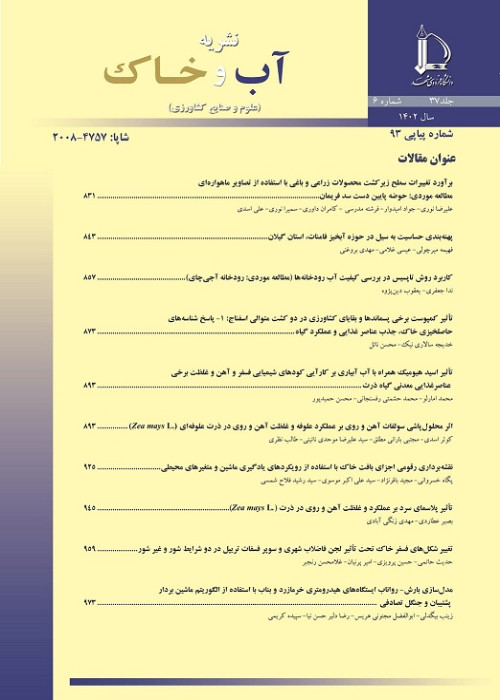Interactive Effects of Pb (NO3)2, Biochar and Salicylic acid on Growth Characteristics of Thyme (Thymus vulgaris L.)
Industrial development has resulted in higher soils pollution with heavy metals. Plants which are subjected to heavy metals may severely lose their yield capabilities. Applying improving compounds in the soil is a new method to reduce effects of heavy metals on plants growth. Biochar as a carbon rich source and salicylic acid as an important plant hormone, are two main compounds to alleviate heavy metals stresses in plants. These are the cost-effective and environmentally friendly substances for increasing the resistance of plants. Lead (Pb), as a common and extremely poisonous element in polluted soils, can be accumulated due to its non-biodegradability nature. When Pb content in plants reaches a toxic level, it can inhibit plant growth by reducing enzyme activities and photosynthesis and changing mineral nutrients balance. However, with regard to the program of expanding the area under cultivation of medicinal plants, including thyme, there is a possibility of contamination of soils in the vicinity of industrial centers and roads with lead. Therefore, the present study was conducted to evaluate the effects of salicylic acid as a plant growth stimulant and biochar made of rapeseed wastes, as a stable organic compound, on alleviation of Pb-induced stress in thyme (Thymus vulgaris L.).
In order to investigate the effects of salicylic acid (SA) and biochar (BC) on reducing Pb stress in thyme (Thymus vulgaris L.), a factorial experiment was conducted based on a completely randomized design with three replications in the greenhouse of Razi University. The factors included Pb at three levels (0, 150, and 300 mg/kg as Pb(NO3)2), SA at three levels (0, 150, and 300 μM) and BC at three levels (0, 1 and 3% by weight). To apply the Pb treatments, the soil samples of each pot (8 kg) were sprayed with Pb(NO3)2 solutions, 4 weeks before planting, according to the contamination levels. Then, BC treatments were performed by mixing it with the soil samples. In each pot, four thyme seedlings were planted. At four-leaf stage, SA solutions were sprayed three times on foliage of the thyme plants , until the beginning of flowering. After harvesting, some characteristics of aerial and root parts of thyme, including soluble sugars and proline contents, plant height, dry weights of shoots and roots, root volume and root length were determined. All plant parameters were then averaged for each pot. Also, Pb concentrations in extracts obtained from digestion of leaf tissues, were measured by Varian AA220 atomic absorption spectrophotometer. The analysis of variance (ANOVA) and comparison of means (Duncan's multiple range test) were performed using SPSS-16 software.
The results revealed that Pb stress reduced all plant characteristics, such as plant height, root volume and root length, as well as, dry weights of shoots and roots, and elevated leaf Pb concentration, proline content and soluble sugars in thyme. However, BC application resulted in improvements in growth parameters. The positive effect of BC was further enhanced when SA was sprayed onto the foliage of the thyme plants. The interaction effects of SA, BC and Pb treatments on the growth parameters of thyme, i.e, shoot dry weight, root volume, Pb concentration, soluble sugars and proline contents were significant (P < 0.01). In other words, SA and BC treatments moderated the negative effects of Pb on the growth traits. The highest Pb concentration (4.83 mg) and proline content (37.8 μmol/g) were obtained in 300 μg/kg of Pb, and SA and BC controls. Also, the highest concentration of soluble sugars (0.46 mg/kg) was found at 300 mg/kg of Pb, 300 μM SA and BC control.
Our results indicated the positive effects of SA and BC treatments on the growth parameters, such as; shoot and root dry weights in thyme plants, especially under Pb stress. In other words, Pb stress, while reducing all growth characteristics, increased proline content and soluble sugars in thyme. In general, it seems that under Pb stress, treatment of thyme with SA (as a plant growth regulator) and BC (as an organic matter with high viability in the soil) is a simple and appropriate method in order to increase the plant's resistance and reduce the effects of Pb toxicity on the overall growth of thyme.
- حق عضویت دریافتی صرف حمایت از نشریات عضو و نگهداری، تکمیل و توسعه مگیران میشود.
- پرداخت حق اشتراک و دانلود مقالات اجازه بازنشر آن در سایر رسانههای چاپی و دیجیتال را به کاربر نمیدهد.



